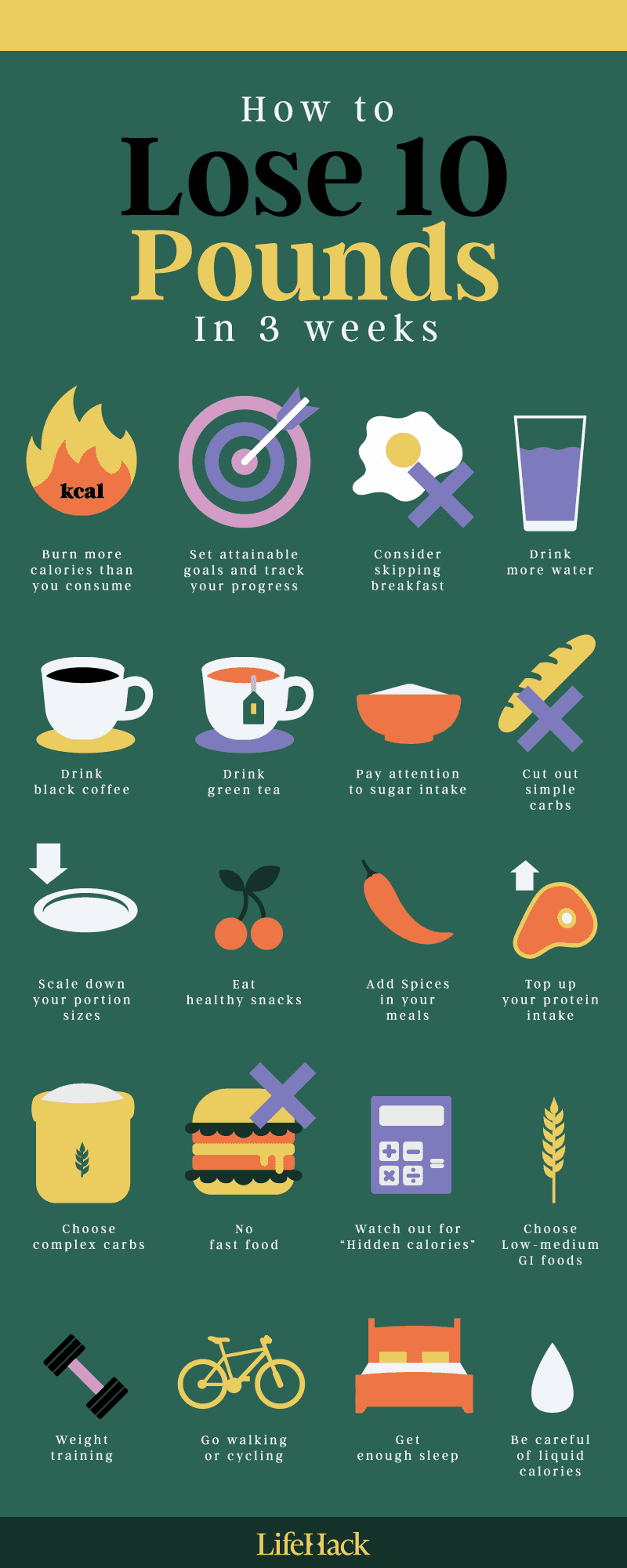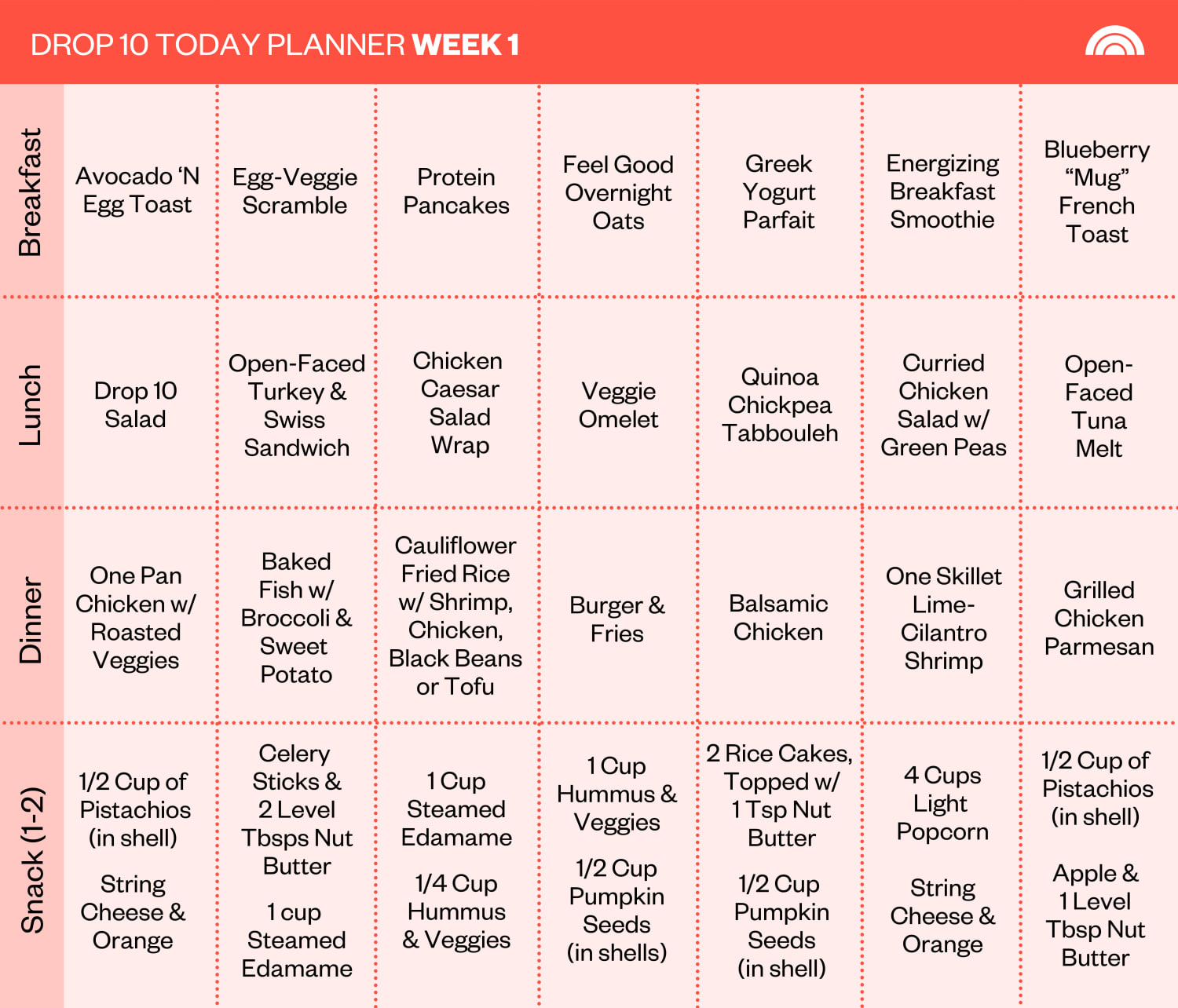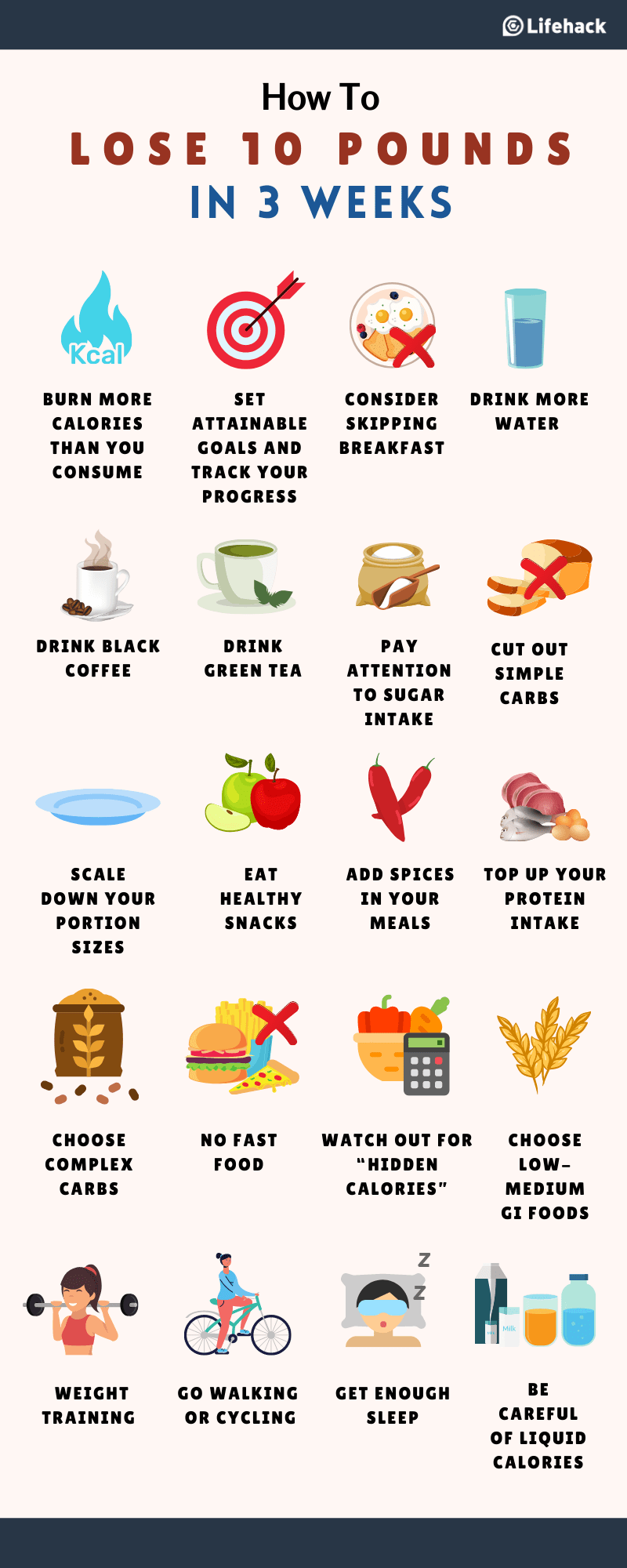In the pursuit of a healthier and fitter body, shedding those extra pounds can be a challenging endeavor. However, with the right knowledge and guidance, achieving a weight loss goal can become attainable and even enjoyable. This article provides a comprehensive list of 20 effective ways to lose 10 pounds in a span of just three weeks. From incorporating healthy eating habits and maintaining an active lifestyle to adopting beneficial mental strategies, these techniques offer a holistic approach to successful weight loss. So, if you’ve been looking for practical and proven methods to shed those extra pounds, look no further – this article has got you covered. Let’s explore the secrets to transforming your body and embracing a healthier lifestyle.

Creating a Calorie Deficit
Reduce calorie intake
When it comes to losing weight, one of the most crucial factors is reducing your calorie intake. Consuming fewer calories than your body burns will create a calorie deficit, which is necessary for weight loss. Start by tracking your current calorie intake and identifying areas where you can cut back. Opt for leaner protein sources, such as skinless chicken breast or fish, and choose low-calorie options for snacks and beverages. Additionally, be mindful of portion sizes and avoid high-calorie condiments and dressings.
Increase calorie burn
Creating a calorie deficit not only involves reducing calorie intake but also increasing calorie burn through physical activity. Engaging in regular exercise can help you burn more calories and aid in your weight loss journey. Incorporate cardiovascular exercises like running, cycling, or swimming into your routine, as these activities elevate your heart rate and increase calorie burn. Additionally, strength training exercises, such as weightlifting or resistance training, can help build lean muscle mass, which further boosts your metabolism. Consider incorporating HIIT (High-Intensity Interval Training) workouts, which involve short bursts of intense exercise followed by periods of rest. Finally, aim to increase your overall daily physical activity by taking the stairs instead of the elevator or going for a walk during your lunch break.
Healthy Eating Habits
Focus on whole foods
A fundamental aspect of healthy eating habits is emphasizing whole foods in your diet. Whole foods are minimally processed and retain their natural nutrients, making them beneficial for weight loss. Fill your plate with a variety of fruits, vegetables, whole grains, and lean proteins. These nutrient-dense foods provide essential vitamins, minerals, and fiber while keeping you fuller for longer. Avoid processed foods that tend to be high in added sugars, unhealthy fats, and empty calories.
Eat more protein
Incorporating adequate protein into your diet is essential for weight loss. Protein can increase feelings of fullness, boost your metabolism, and help preserve muscle mass during calorie restriction. Include lean sources of protein such as chicken, turkey, fish, tofu, or legumes in your meals. Additionally, consider adding protein-rich snacks like Greek yogurt, cottage cheese, or protein bars to your diet.
Include fiber-rich foods
Including fiber-rich foods in your meals can contribute to weight loss by promoting feelings of fullness and aiding in digestion. Choose whole grains like oats, quinoa, or brown rice, and incorporate plenty of fruits, vegetables, and legumes into your diet. These foods are not only rich in fiber but also packed with valuable antioxidants, vitamins, and minerals.
Reducing portion sizes
Portion control plays a crucial role in weight loss. Even if you are consuming healthy foods, eating excessive portions can hinder your progress. Be mindful of portion sizes and consider using smaller plates or bowls to help manage your serving sizes. Learn to listen to your body’s hunger and fullness cues to avoid overeating.
Drink plenty of water
Staying hydrated is vital for overall health and weight loss. Drinking an adequate amount of water can help you feel full and can prevent overeating. Aim to drink at least 8 cups (64 ounces) of water per day, or more if you are physically active. Water can also replace high-calorie beverages like sugary sodas or fruit juices, which contribute unnecessary calories to your diet.

Meal Planning
Plan and prepare meals in advance
Meal planning is a great way to ensure you make healthy choices and avoid impulsive food decisions. Take some time each week to plan and prepare meals in advance. This allows you to create balanced meals, control portion sizes, and save time during busy weekdays. Consider using meal planning apps, writing down a grocery list, and batch cooking to make your meal preparation efficient and stress-free.
Avoid unhealthy snacks
Snacking can easily derail your weight loss efforts if you choose unhealthy options. Instead of reaching for sugary or processed snacks, keep your pantry stocked with healthier alternatives. Opt for fresh fruits, raw vegetables with hummus, or a handful of nuts for a satisfying snack. If you struggle with cravings, plan your snacks in advance to avoid making impulsive choices.
Avoid eating out
Eating out at restaurants or getting takeout often leads to consuming larger portions and higher calorie meals. To maintain a calorie deficit and stay on track with your weight loss goals, limit your eating out occasions. Instead, focus on cooking and enjoying nutritious meals at home where you have control over the ingredients and portion sizes.
Physical Activity
Cardiovascular exercises
Including cardiovascular exercises in your fitness routine is crucial for burning calories and improving cardiovascular health. Activities like running, cycling, swimming, or brisk walking get your heart rate up and help you burn more calories. Aim for at least 150 minutes of moderate-intensity cardio exercises or 75 minutes of vigorous-intensity exercises per week.
Strength training
Strength training is essential for building lean muscle mass and boosting your metabolism. Muscles burn more calories than fat, even at rest, making strength training an effective way to increase your calorie burn. Incorporate exercises like weightlifting, resistance band workouts, or bodyweight exercises into your routine. Aim for at least two strength training sessions per week, targeting different muscle groups.
Incorporate HIIT workouts
High-Intensity Interval Training (HIIT) workouts are a time-efficient way to burn calories and increase your fitness level. These workouts involve alternating between short, intense bursts of exercise and periods of rest or lower intensity. HIIT workouts can be done with various exercises such as sprinting, burpees, jumping jacks, or high knees. Incorporate HIIT sessions into your routine 2-3 times per week for maximum calorie burn.
Increase daily physical activity
In addition to structured exercise sessions, find ways to increase your daily physical activity. Take the stairs instead of the elevator, go for a walk during your lunch break, or park farther away from your destination to encourage more movement throughout the day. Every bit of activity adds up and contributes to your overall calorie burn.

Getting Sufficient Sleep
Importance of sleep for weight loss
Sufficient and quality sleep plays a critical role in weight loss and overall health. Lack of sleep can disrupt hunger and fullness hormones, leading to increased appetite and cravings. It can also negatively affect your metabolism, making it harder to lose weight. Aim for 7-9 hours of sleep per night to support your weight loss efforts.
Establish a bedtime routine
Creating a consistent bedtime routine can help signal your body that it’s time to wind down and prepare for sleep. Establish a relaxing routine that may include activities like reading a book, taking a warm bath, or practicing relaxation techniques like deep breathing or meditation. Avoid electronics and stimulating activities before bed as they can interfere with your ability to fall asleep.
Create a sleep-friendly environment
Make your sleeping environment conducive to a good night’s sleep. Keep your bedroom dark, quiet, and at a comfortable temperature to promote optimal sleep. Invest in a supportive and comfortable mattress and pillow to ensure proper rest for your body.
Managing Stress
Identify stress triggers
Stress can often lead to overeating or making unhealthy food choices as a way to cope. Identify the sources of stress in your life and develop strategies to manage them effectively. This may involve minimizing exposure to stress triggers or finding healthy outlets for stress relief, such as exercise, meditation, or engaging in hobbies.
Practice stress-reducing techniques
Incorporate stress-reducing techniques into your daily routine to help manage stress levels. Deep breathing exercises, yoga, mindfulness meditation, or regular physical activity can all be effective methods for reducing stress. Experiment with different techniques and find what works best for you.

Mindful Eating
Eat slowly and mindfully
Practicing mindful eating can help you establish a healthier relationship with food and prevent overeating. Slow down while eating, taking time to chew each bite thoroughly and savor the flavors. Pay attention to your body’s hunger and fullness cues and stop eating when you feel satisfied, but not overly full.
Pay attention to hunger and fullness cues
Learning to recognize your body’s hunger and fullness cues is crucial for weight management. Mindful eating involves tuning in to your body’s signals and eating when you’re hungry, rather than based on external cues like time or emotions. Similarly, stop eating when you’re comfortably full, avoiding the temptation to clean your plate or eat beyond your body’s needs.
Avoid emotional eating
Emotional eating is a common response to stress or negative emotions. Instead of using food to cope with your feelings, find alternative strategies for emotional support, such as talking to a friend, practicing relaxation techniques, or engaging in a hobby or activity you enjoy.
Practice portion control
Portion control is essential for maintaining a calorie deficit and promoting weight loss. Use measuring cups or a food scale to portion out your meals and snacks, and be mindful of serving sizes when dining out. Over time, you’ll become more familiar with appropriate portion sizes and be able to intuitively eat in a way that supports your weight loss goals.
Intermittent Fasting
Understanding intermittent fasting
Intermittent fasting is an eating pattern that cycles between periods of eating and fasting. It has gained popularity as a weight loss strategy due to its potential to promote calorie restriction and improve metabolic health. There are several different methods of intermittent fasting, ranging from shorter daily fasts to longer fasting periods several times per week.
Different fasting methods
Common methods of intermittent fasting include the 16/8 method, where you fast for 16 hours and restrict your eating to an 8-hour window each day, and the 5:2 method, where you eat normally for five days and restrict calories to 500-600 on two non-consecutive days. Explore different fasting methods and find one that aligns with your lifestyle and preferences.
Benefits and considerations
Intermittent fasting may offer benefits beyond weight loss, such as improved insulin sensitivity, reduced inflammation, and enhanced brain health. However, it may not be suitable for everyone, especially those with certain medical conditions or who are pregnant or breastfeeding. It’s important to consult with a healthcare professional before starting intermittent fasting to ensure it is safe for you.

Reducing Sugar Intake
Identify hidden sugars
Reducing sugar intake is crucial for weight loss and overall health. Many processed foods contain hidden sugars, making it essential to read food labels and identify sources of added sugars. Pay attention to ingredients such as high fructose corn syrup, cane sugar, or syrups, as these indicate the presence of added sugars.
Choose natural sweeteners
If you crave something sweet, opt for natural sweeteners in moderation. Stevia, monk fruit extract, or raw honey can be used as alternatives to refined sugar. However, it’s important to note that even natural sweeteners should be consumed in moderation as part of a balanced diet.
Limit sugary beverages
One of the largest sources of added sugars in many diets is sugary beverages like soda, juice, or sweetened coffee drinks. These beverages provide empty calories and can contribute to weight gain. Choose water, unsweetened tea, or infused water options instead to stay hydrated without adding unnecessary sugars to your diet.
Hydration
Importance of staying hydrated
Staying hydrated is essential for overall health and supports weight loss efforts. Water plays a vital role in various bodily functions, including digestion, metabolism, and regulating body temperature. Adequate hydration can also help curb appetite and prevent overeating.
How much water to drink
The amount of water you need to drink varies based on individual factors such as activity level, climate, and overall health. However, a general guideline is to drink at least eight cups (64 ounces) of water per day. If you are physically active or live in a hot climate, you may need to increase your water intake accordingly.
Infused water options
To make staying hydrated more enjoyable, consider infusing your water with natural flavors. Add slices of citrus fruits, berries, cucumber, or herbs like mint or basil to your water for a refreshing twist. Infused water provides a subtle flavor without the added sugars or calories found in sugary beverages.
Incorporating these strategies into your lifestyle can help you achieve your weight loss goals in a healthy and sustainable manner. Remember, it’s essential to consult with a healthcare professional or registered dietitian before making any significant changes to your diet or exercise routine. With dedication and consistency, you can create a calorie deficit, adopt healthy eating habits, and achieve successful weight loss.
